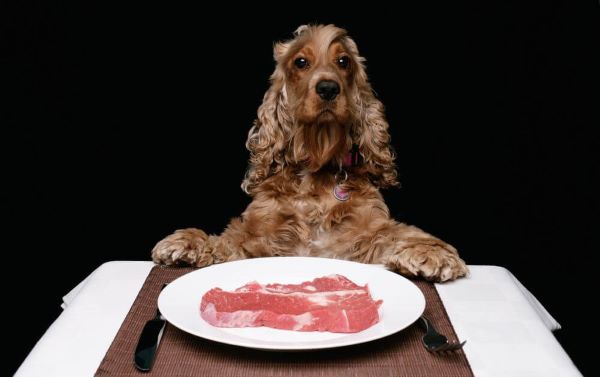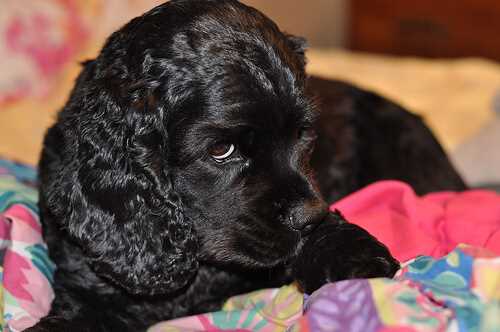- Home
- Best quality dog food
- Barf diet
The BARF Diet: Bones and Raw Food Diet for Dogs - Is It Safe?
The BARF diet (bones and raw food) is becoming increasingly popular. Find out why many pet owners are changing and understand the benefits and risks of a raw dog food diet to help you decide whether or not it's right for your Cocker Spaniel.
What Is A Raw Dog Food Diet?
BARF stands for 'Bones And Raw Food' or 'Biologically Appropriate Raw Food' and is also known as the raw dog food diet.
Raw Meat And Bones
It contains foods similar to those a dog (wolf) would have eaten in the wild and is made up of mainly raw meat and bones, such as:
 I'm on a BARF diet. Pass the salt, please.
I'm on a BARF diet. Pass the salt, please.- beef,
- lamb,
- chicken,
- turkey,
- duck,
- rabbit.
If raw pork or wild game is eaten, it can cause certain parasitic diseases, such as Trichinosis.
Pork and wild game can only be safely eaten if the meat is cooked correctly. This will kill off any parasites or bacteria within the meat.
On the other hand, bones should never be cooked as they become brittle and can splinter and choke your dog or pierce his digestive system.
Your Cocker shouldn't eat just one type of meat. Instead, he should eat a good variety of raw flesh to help him absorb the different nutritional values of each meat source.
Don't forget to feed your Cocker plenty of organ meat (offal).
Apart from being very tasty, it's very nutritious too. Around 12% of his food should be made up of offal. Any will do the job; kidney, liver, heart etc.
Raw Fish
The BARF diet can also include fish; however, it's best to avoid raw salmon as it can carry parasites called flukes. When eaten, the flukes attach themselves to the dog's intestines and release bacteria into the bloodstream, which can cause the dog to become quite ill.
Fortunately, the cooking process kills any bacteria present, so as long as the fish is cooked, you can safely feed it to your dog.
Raw Fruit And Vegetables
The BARF diet also includes raw vegetables such as carrots, small cubes of raw peeled potato, carrot, sweet potato, cauliflower, cabbage, Brussels sprouts, spinach, parsnips, peas, celery, asparagus, and broccoli and green beans.
Max enjoys raw red pepper, and he simply loves courgette (however, I always cook the courgette - 4 mins in the microwave).
Keep the portions of broccoli to a minimum as too much can give your dog wind or, at the very worst, bloating.
Don't forget to add fruit to the diet; blueberries, apples, bananas, melon, strawberries and pears; these provide an excellent nutritional contribution to your dog's raw food diet.
Sources of Calcium
Eggs may be full of protein, but the shells are packed with calcium! Simply crush them down and add them to his food. Alternatively, you can bake batches of them in a hot oven to dry them out before grinding them to a powder and sprinkling them on his dinner.
Cottage cheese and plain yoghurt may also be included in a raw food diet and are another excellent source of calcium.
Nuts
Unsalted, plain nuts, such as almonds, peanuts, and walnuts, may also be included in the diet as they're an excellent source of fats.
However, beware of macadamia nuts as they are listed as one of the foodstuffs which can be poisonous to our dogs in our dangerous foods article.
Herbs
Herbs, such as parsley, thyme, bay, and rosemary (a natural preservative) may be used to enhance the flavour of your pet's food, as well as adding extra nutritional value.
Grains
Some say that wolves would have eaten grains, albeit indirectly because the grains would have been in the stomach of the animals they ate.
Others believe whole grains (cooked or otherwise) should not be included in a raw food diet.
My take on this is that it's a personal choice; if you want to feed your dog grains, do so; otherwise, there's no need.
Benefits of a BARF Diet For Your Dog
There are many benefits to feeding your Cocker Spaniel a raw food diet:
- Food loses some of its nutritional value during the cooking process, whereas raw food remains whole, making it much better for your pet.
- Your dog's teeth will be much cleaner, tartar build-up is almost eliminated, and his breath will improve. Yay!
 Barf diets managed properly, can help fight allergies
Barf diets managed properly, can help fight allergies- Eating raw food also helps to reduce general 'doggie smells' caused by bacteria and yeast.
- Symptoms associated with dog food allergies may be alleviated, such as itchy skin, dull coat, and ear infections.
- The BARF diet helps produce firmer, smaller stools that don't smell.
- Raw food takes longer to chew, but this improves digestion, which helps to maintain your dog's weight and reduce his chances of joining the ranks of overweight Cocker Spaniels!
- Your dog's immune system will be significantly improved.
- A raw dog food diet is said to help increase mobility in arthritic dogs.
- Your dog will have more energy, and you'll see an improvement in his general health and well-being.
- Feeding your dog on a raw food diet can help to prolong his life.
- Over time, you may even notice reduced vet bills due to a more healthy dog.
- Your dog will find a raw food diet more exciting and delicious!
- If your local friendly butcher agrees to supply the meat, offal, bones and scraps at a reasonable price, the BARF diet can work out cheaper than commercial dog food.
With so many good reasons for changing your Cocker Spaniel onto raw food, what are you waiting for?
Why not look at some of our raw dog food recipes - they might just inspire you to give it a try!
BARF Diet: The Downside To A Raw Food Diet
- As with everything else in life, there is a downside to feeding your pet a BARF diet.
- Finding a good selection of raw food for dogs can be time-consuming, particularly if you have a busy schedule with family and/or work commitments.
- Preparation can also be time-consuming and sometimes quite messy.
- Raw food can carry dangerous bacteria, so it's vital that all kitchen surfaces are wiped with bacterial spray, utensils are cleaned thoroughly, and hands washed regularly.
- Large bones can choke your pet, break his teeth or splinter and puncture your pet's insides.
- If not properly balanced, a prolonged BARF diet may damage your pet's health.
Tips For Feeding Your Dog A BARF Diet
If you decide to give raw dog food a trial, here are a few tips:
- Raw meat and bones should make up around 40-60% of your dog's diet.
- All bones must be raw; cooked bones can sometimes splinter and choke your dog or cause damage to his digestive system.
 I love raw meat and vegetables!
I love raw meat and vegetables!- Cut fruit and vegetables into small bite-sized pieces and then gently squeeze to release a little juice - this will help your dog get the most nutrition from his food.
- Alternate the kind of meats used in your dog's raw food diet so that he doesn't get bored and to help him get the best out of his food. Varying the choice of meats may also help prevent allergies from developing.
- Don't be surprised if your dog doesn't seem to drink as much water on this diet; the water content in a raw dog food diet is higher than in commercially prepared dry food.
- You might want to supplement your pet's diet with vitamins and minerals and perhaps some omega oils.
- Feed your dog between 2 and 4% of his ideal body weight.
- Depending on your dog's lifestyle, he may begin to add or lose a little weight. If his weight increase, reduce his food slightly until it stabilizes.
- If you feel he's looking a little thin, increase his food immediately. If you're at all worried about getting this right, please speak to your vet.
BARF Diet for Dogs: Summary
If you ensure your Cocker Spaniel has a complete and varied diet, there's no reason why it shouldn't be a safe and healthy alternative to commercial dog food.
Because all dogs are different and have different nutritional needs, I recommend you chat with your vet and ask his advice for your particular pet before changing him on to a BARF diet.
And don't forget, when and if you decide to change over, do it gradually. We don't want any upset tummies, do we?
The BARF diet isn't for all dogs, particularly those that eat their food too quickly, without chewing, and are not terribly interested in a leisurely chew on a bone.
Max gobbles his food (he practically inhales it!), so, unfortunately, this isn't the diet for him!
If you're not convinced about a raw food diet for dogs, you'll find many healthy diets using cooked food - see our articles on natural and organic dog food for more information.
Further Information on the BARF Diet
If you'd like more information on raw dog food this article by Brennen McKenzie, MA, VMD, entitled Raw Meat and Bone Diets for Dogs: It's Enough to Make You BARF may be just what you're looking for.
Photo Credits: Barf Diet
1. kolbz at https://www.istockphoto.com/photo/spoilt-dog-gm172876348-6663952
2. Noel Abejo - https://www.freeimages.com/photo/kipper-1381690
3. Juplife at Flickr.com


